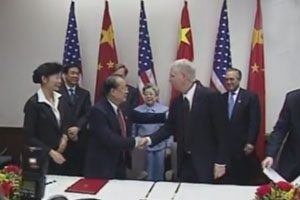
U.S. And Chinese Government Have Import Safety Agreement. Tainted food imports from China were very much in the news this year. But after months of recalls involving contaminated food from China, the US and Chinese governments have reached a food and drug safety agreement. The new US – China food safety agreement allows US […]

U.S. And Chinese Government Have Import Safety Agreement. Tainted food imports from China were very much in the news this year. But after months of recalls involving contaminated food from China, the US and Chinese governments have reached a food and drug safety agreement. The new US – China food safety agreement allows US inspectors access to Chinese factories and ensures Chinese manufacturers continued access to the US market. Bush administration negotiators hailed the agreement as a major step toward addressing imported goods safety, enabling them to claim a political victory in the fight against tainted imports; the agreement also enables China to begin recovering from damaging publicity. The deal marks China’s most aggressive regulatory step in response to US demands for greater scrutiny and Chinese leaders acknowledge that an issue they initially dismissed has tainted broader US-China relations.
The US Food and Drug Administration (FDA) imposed restrictions several months ago on some Chinese fish, including shrimp, when banned antibiotics turned up in import shipments. Under the new agreement, Chinese exporters will register with the Chinese government and agree to annual inspections by China’s office of General Administration of Quality Supervision, Inspection, and Quarantine; enforcement will be at the discretion of the Chinese. The agreement calls for both countries to notify each other within 48 hours of learning of the emergence of significant risk to public health. Responding to this year’s rash of recalls, Bush formed a Cabinet-level import safety review panel that allows FDA officials to inspect Chinese facilities under limited conditions; Tuesday’s agreement expands that role. The agreement doesn’t guarantee continued FDA or other US inspectors presence in Chinese facilities; it is simply a pledge from the Chinese to facilitate manufacturing plant access. If adhered to, it could signal a significant trade policy change. FDA inspectors experienced delays earlier this year when they sought to examine Chinese plants that had produced wheat gluten laced with melamine, a compound used to make plastic. The gluten was exported for use in pet food in the US.
Both sides pledged to establish a working group to develop benchmarks with which to regulate products that could include the rate of imports; the percentage of items exported to the US by companies not registered with the Chinese government; and the volume, frequency and public-health significance of recalled products.
While critics praise the agreement’s intent, they criticize its failure to provide truly sufficient safeguards to prevent further imports of—for example—seafood tainted by banned antibiotics or pet food ingredients blended with adulterants. Tuesday’s agreement does not send a strong enough signal to the Chinese, nor do its authors seem to clearly understand the US consumer. While the agreement can be expanded and does cover food—preserved foods; pet food and treats; raw materials used in making food, such as wheat and rice protein; and farm-raised fish, including shrimp and catfish—drugs, and medical devices, it only applies to 10 products and does not address toys and cribs, raising serious questions as to its effectiveness. Measures are unlikely to spur abrupt changes in other parts of China’s export economy, which is vast and under-regulated. If these first steps prove effective, and can begin to repair damage to the Made in China brand, both sides could find it in their interest to expand the program.
The personal injury attorneys at Parker Waichman LLP offer free, no-obligation case evaluations. For more information, fill out our online contact form or call 1-800-YOURLAWYER (1-800-968-7529).


